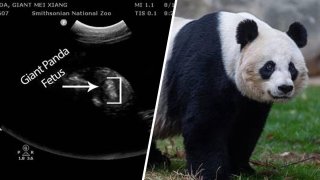
Vets at the Smithsonian's National Zoo detected a potential bundle of joy for the zoo's seasoned giant panda parents -- but they're also emphasizing that we may need to temper our expectations.
"It is too early to determine if the tissue is a completely viable developing fetus as there is the potential that the fetus could be resorbed," said a press release Friday from the zoo.
Deep breaths, everyone.
Photos: See Bei Bei Grow From Cub to Giant Panda
We're making it easier for you to find stories that matter with our new newsletter — The 4Front. Sign up here and get news that is important for you to your inbox.
Vets first detected fetal tissue last week and have since seen developing skeletal structure and strong blood flow in Mei Xiang's uterus, the zoo said. However, there's still "a substantial possibility" that Mei could reabsorb the fetus or have a miscarriage, the zoo cautions. "Scientists do not fully understand why some mammals resorb fetuses," the zoo said.
Local
Washington, D.C., Maryland and Virginia local news, events and information
But if things do progress well, Mei Xiang could give birth within just days.
"In the middle of a pandemic, this is a joyful moment we can all get excited about,” said Don Neiffer, chief vet at the National Zoo. "We are optimistic that very shortly she may give birth to a healthy cub or cubs. We’re fortunate that Mei Xiang participated in the ultrasound allowing us to get sharp images and video. We're watching her closely and welcome everyone to watch with us on the panda cams."
Mei Xiang has given birth to three surviving cubs, all of whom delighted D.C.-area residents as they grew up at the zoo. All three now live in China, per an agreement between China and the U.S.
Mei Xiang was artificially inseminated back in March with semen from the zoo's resident male giant panda, Tian Tian. So why are we just getting potential baby news now?
"Unlike humans, giant pandas experience a phenomenon referred to as delayed implantation," the zoo says. When fertilization occurs, an embryo doesn't attach to the uterine wall until weeks or months later, the zoo says.
Vets and the giant panda team have been performing regular ultrasounds on Mei Xiang since July to track changes in her reproductive tract, the zoo said.
Stay tuned, everyone.



